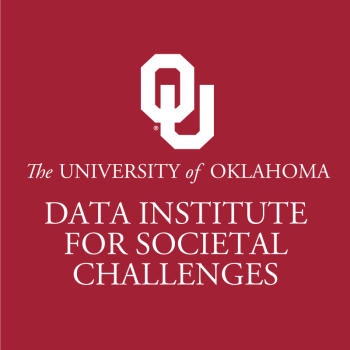The Data Institute for Societal Challenges will sponsor three projects that advance data science research. Inspired by a recent announcement from the Department of Energy to provide funding for science-based artificial intelligence projects, DISC hosted a two-part workshop to help OU faculty develop teams and competitive proposals for research projects that involved AI-enabled solutions aligned with the DOE’s mission.
David Ebert, DISC director and associate vice president for research and partnerships said, “the aim of the workshop was to help faculty develop compelling proposals and research projects that could successfully compete for significant external funding from the DOE.”
Three projects with interdisciplinary faculty teams were awarded seed funding to support the development of their proposals.
One team received $4,000 in seed funding to support their research project, “Blending Data Streams to Create Reliable Ecological Forecasts.” Yifu Li, Charles Nicholson and Dean Hougen, of the Gallogly College of Engineering, with Jeff Kelly in the Department of Biology, lead the project which will attempt to bridge disparate data sources to improve researchers’ ability to model and make predictions about future environmental states.
Li, an assistant professor in the School of Industrial and Systems Engineering said the funding provides “a great opportunity for bridging the gap between artificial intelligence advancement and societal challenges.”
“Our joint efforts generate research synergy of AI, engineering, and scientific innovation to reveal critical insights from big data…The funding provided supports our team for grant writing and long-term transdisciplinary research collaboration.”
Two additional teams will receive $3,000 in seed funding for their projects.
The project team for “Accelerated Optoelectronic Materials Design and Discovery Guided by Machine Learning and Advanced Computation” includes engineering faculty Hougen, Samuel Cheng, and Bin Wang, with Kun Lu of the School of Library and Information Studies and Bayram Saparov of the Department of Chemistry. They will apply advanced computational methods, data mining and machine learning in predictive preparation of materials for solar energy and energy-saving lighting technologies, like light-emitting diodes (LEDs).
Hougen and Cheng also join Deepak Devegowda of the Mewbourne School of Petroleum and Geological Engineering, and Yihan Shao of the Department of Chemistry, for “Machine-Learning Assisted Molecular and Coarse-Scaled Dynamics.” This project will focus on developing new techniques in the area of state space models and deep learning to extend the power of molecular dynamics to make possible the simulations of large molecules, such as proteins and asphaltenes, in realistic environments.
Ebert said these projects represent promising transdisciplinary research that solves real-world problems.
“With this small investment, these projects stand to receive significant longer-term support to create real solutions to grand challenges,” he said.
DISC intends to continue the program in spring 2021. More information is available at https://ou.edu/disc


